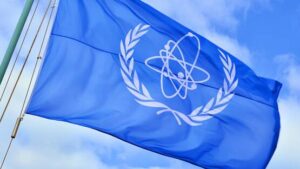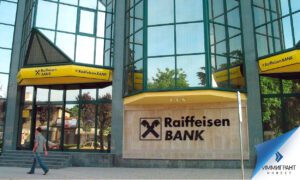
International Nuclear Energy Agency Director-General Rafael Mariano Grossi has described the radiation levels at the Chernobyl nuclear power plant as normal after it was occupied by Russian troops, AFP reported.
“The level of radiation, I would say, is normal … There were certain moments when the level increased due to the movement of heavy equipment that Russian troops brought here, and when they left the station,” Grossi was quoted by AFP during his visit to the Chernobyl nuclear power plant on April 26.
The agency, which previously indicated that the IAEA Director General called the level of radiation abnormal, subsequently corrected his words on his Twitter.
As reported, Grossi visits the Chernobyl nuclear power plant on the anniversary of the accident on April 26. He led the agency’s mission to the station to deliver various types of radiation monitoring equipment, including radionuclide identification devices and gamma dose rate meters, to the Chernobyl nuclear power plant, as well as conduct radiological and other assessments. In addition, IAEA experts plan to repair the systems for remote monitoring of safeguards that stopped transmitting data to the agency’s headquarters in Vienna immediately after the station was seized by Russian invaders.
As noted by the IAEA, since the withdrawal of the Russian military from the Chernobyl nuclear power plant, Ukraine has taken significant steps to operate it safely, but the overall situation in the exclusion zone remains difficult, in part due to damaged bridges and demining activities.
The IAEA also noted that, in close coordination with Ukraine, it developed detailed plans for providing assistance in the security of the country’s nuclear facilities.
Russian troops left the Chernobyl zone on March 31 after a five-week stay in it since the capture at the beginning of the war on February 24. During their stay in the zone, the Russian military, in particular, built fortifications over a large area, including in the Red Forest, the dirtiest point in the zone. According to the head of GAZO Yevgeny Kramarenko, the risk of serious infection of the military and equipment from such actions is high. At the same time, according to him, during the retreat from Kyiv, Russian troops withdrew about 10,000 pieces of heavy equipment through Chernobyl, which, like the military, could also be contaminated with radiation when moving through dangerous territory. The movement of a large amount of military equipment provoked the rise of radiation dust and an increase in radiation in the zone.
According to the head of NAEK Energoatom Petr Kotin, in some places the radiation level was exceeded 50 times.

Germany will send 50 Gepard anti-aircraft systems to Ukraine, Canada 8 armored vehicles, Britain additional anti-aircraft systems, US Secretary of Defense Lloyd Austin said.
“I want to especially welcome Germany’s significant decision as Minister Lambrecht announced today that Germany will send 50 Gepard anti-aircraft systems to Ukraine. Yesterday, the British government announced that it would also provide additional anti-aircraft systems to Ukraine. Canada today announced that it would send 8 armored vehicles to Ukraine. This is important progress, we see more every day,” Austin said at a press conference following a meeting of defense ministers from more than 40 countries regarding Ukraine’s current and future defense needs at Ramstein Air Base in Germany on Tuesday.

The fall of the Ukrainian economy in 2022 will be about 33% according to the baseline scenario, in which the war will last for another month and a half at the most, Alexander Pecheritsyn, a leading analyst at Raiffeisen Bank (Kyiv), said.
“If the war lasts until the end of the year, then (GDP) could fall as much as 45%,” he said at a zoom conference on Tuesday.
Pecheritsyn specified that this is the bank’s third forecast since the beginning of the war. According to him, the initial decline in the economy was estimated at about 15% based on previous fast-moving conflicts in the world, for example, in Georgia. Then, in March, the bank estimated a decline as low as 24%, taking into account the gross regional product and the map of hostilities. In particular, as part of this analysis, a 34% decrease in this year’s crop is expected.
Serhiy Kolodiy, Chief Manager for Macroeconomic Analysis at Raiffeisen Bank, recalled that in 2014-2015, the fall in GDP was approximately 25% compared with pre-war Ukraine (in official statistics, data are compared only for controlled territories).
Pecheritsyn added that in terms of GDP, the bank estimates a 39% drop in private consumption due to the emigration of 15% of the population, lower incomes and negative consumer expectations.
According to him, domestic investment, which is the most vulnerable component, will fall by half this year under the baseline scenario.
“On the positive side, production relocation programs have little effect, but on the scale of the total output, of course, it is small,” the analyst said.
Speaking about inflation, Pecheritsyn noted that the bank still maintains its forecast for this year at 17% after 10% in the past. He explained that the volume of purchases by the National Bank of military bonds in the amount of UAH 60 billion is still within the limits of controllable, in addition, state control over prices and the freezing of utility tariffs affect.
In general, speaking about the work of analysts during the war, Pecheritsyn said that the bank began issuing weekly military reviews.
“War is a new challenge, we are no strangers to them, since there was a coronavirus two years ago. But the current (challenge) is much more difficult,” he stressed.
Pecheritsyn until February of this year served as chief economist at Credit Agricole Bank (Kyiv).
As reported, according to the World Bank, which before the war expected the Ukrainian economy to grow by 3.2% this year, it will fall by 45.1%. According to his report from early April, in 2023 the Ukrainian economy is expected to recover by only 2.1%, which is also worse than previous expectations of 3.5%.
The National Bank of Ukraine predicts a decline in the country’s GDP this year by at least a third, refusing to make more detailed estimates. The IMF expects a 35% decline.

The British authorities, in response to Russia’s military aggression against Ukraine, on Tuesday distributed an updated sanctions list with technical changes in relation to 195 Russian individuals and legal entities included in it, there are no new defendants on the list.
According to the document, changes have been made, in particular, to the data of Commander-in-Chief of the Navy Nikolai Evmenov and his deputies, who fell under sanctions in March, as well as to sanctioned members of the Federation Council and the State Duma.
Also, technical changes have been made to the data of the Deputy Ministers of Defense of the Russian Federation Alexander Fomin, Alexei Krivoruchko, Yuri Sadovenko, Yunus-Bek Yevkurov, Timur Ivanov. The data of a number of other Russian military personnel has also been updated.

The general meeting of Ukrainian Premier League (UPL) participants supported the proposal to end the 2021/22 football championship, fixing the standings as of February 24, 2022.
According to a statement on the UPL website, this decision was made due to the fact that the championship cannot be completed as a result of the extension of martial law in Ukraine due to Russian military aggression.
As of February 24, 2022, after 18 rounds, Shakhtar ranked first with 47 points, Dynamo – second with 45 points, Dnipro-1 – third with 40 points, Zorya – fourth with 36 points, Vorskla is fifth with 33 points.
There will be no awards for winners. The corresponding decision was submitted for approval by the Executive Committee of the Ukrainian Football Association.
Also, the general meeting of the UPL participants created a working group that will work on the issues of the current activities of the league and the start of the next season.

The American postal service UPS has suspended its work in Ukraine.
As reported on its website, the decision was made “because of the situation in Ukraine.” Operations have also been halted in Belarus and Russia.
UPS provides mail service in 220 countries around the world.